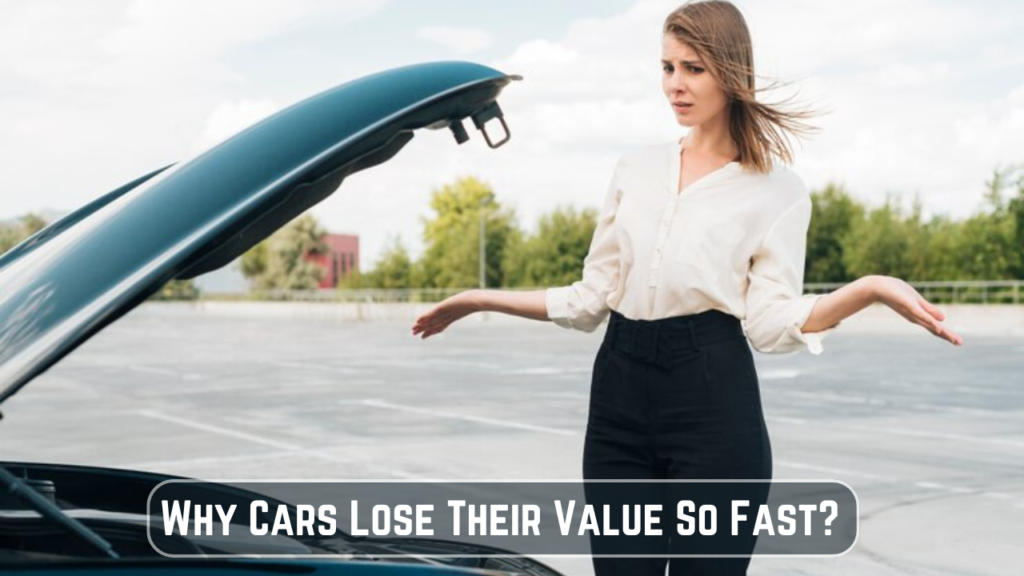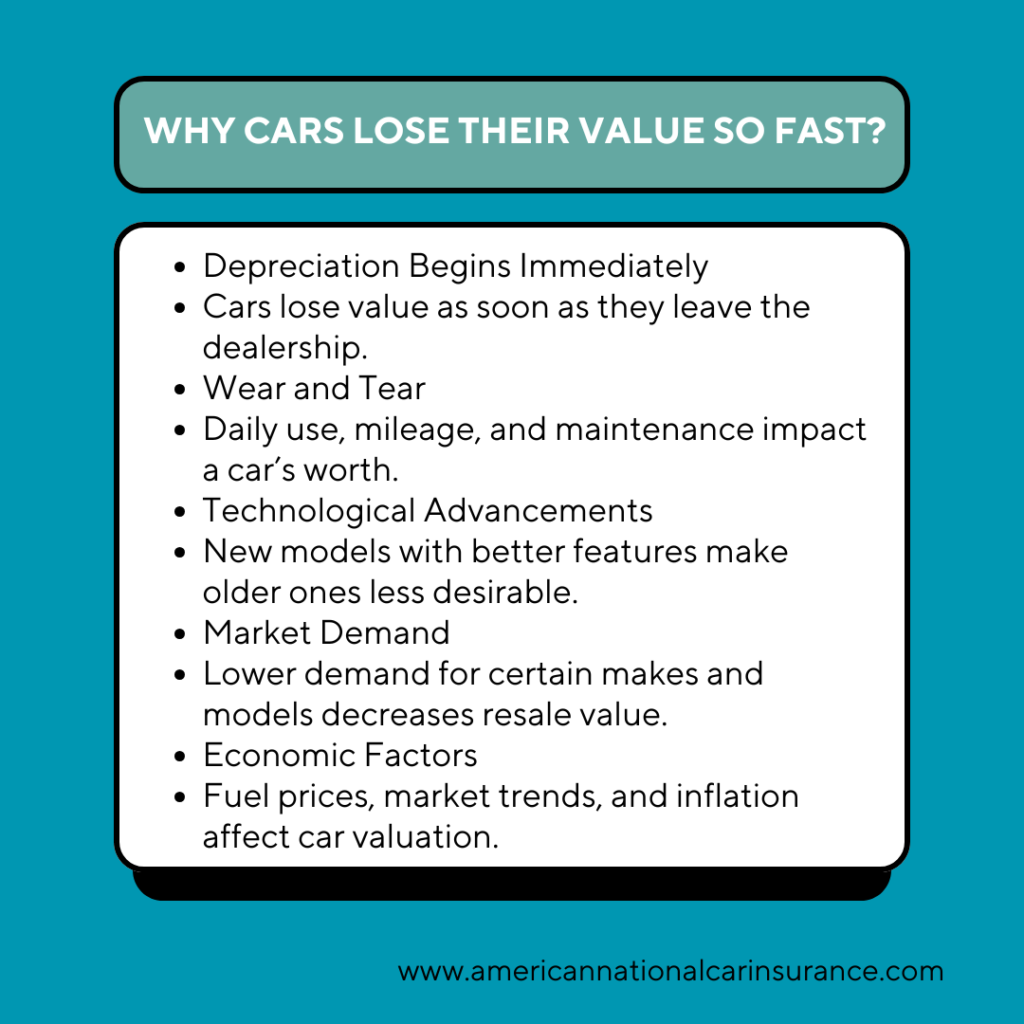
Many see car ownership as a key life step. Yet, a surprising truth hits car owners.
a car’s value drops instantly after purchase. This drop, called depreciation, affects nearly all cars. So, why do cars lose value so quickly? Let us look at the reasons.
What is Depreciation in Cars?
Depreciation is the drop in a car’s value over time. Factors include age, wear, and market demand. Unlike some assets, cars don’t gain value. They are depreciating assets. They lose value once bought and used
Key Highlights of Depreciation
- New cars can lose up to 20-30% of their value within the first year
- After five years, most cars retain only about 40-50% of their original value
- Depreciation varies depending on the car’s brand, model, and condition
Major Reasons for Rapid Depreciation

1. Initial Purchase Markup
When you buy a new car, part of the price includes dealer costs, taxes, and manufacturer markups. These costs are not retained as part of the car’s resale value, leading to an immediate drop when the car leaves the dealership
2. Wear and Tear
As soon as you start using a car, it experiences wear and tear, including:
- Mileage– High mileage significantly reduces a car’s value
- Interior and Exterior Damage– Scratches, dents, and a worn-out interior lower resale value
3. Technological Obsolescence
Newer cars come with advanced features like better infotainment and safety systems. Older cars, lacking these, can seem outdated. This causes their value to drop quickly
4. Market Trends and Demand
Some cars, like sedans, may lose value quickly due to market changes. However, SUVs and electric vehicles (EVs) are in high demand now. This demand slows their depreciation compared to less popular cars
5. Maintenance History
A car with poor maintenance records or one requiring frequent repairs depreciates faster. Potential buyers often view such cars as risky investments
6. Brand Reputation
A manufacturer’s reputation affects a car’s value drop. For example, luxury brands like Lexus and Porsche retain value better. In contrast, lesser-known or budget brands often lose value more quickly
How Much Value Do Cars Lose?
Depreciation varies by car, but the general pattern is as follows
| Year | Average Depreciation Rate | Remaining Value (%) |
| 1 | 20-30% | 70-80% |
| 2 | 15-20% | 55-65% |
| 3 | 10-15% | 40-55% |
| 5 | 50-60% | 40-50% |
| 10 | 70-80% | 20-30% |
Which Cars Hold Their Value Best?
Certain types of cars depreciate slower than others. Here’s what affects a car’s ability to hold its value
- Resale Popularity– Models like the Toyota Tacoma and Jeep Wrangler are known for their strong resale value.
- Fuel Efficiency– Cars with excellent mileage, especially hybrids and EVs, tend to retain value longer.
- Limited Supply– Limited-edition or rare models often maintain higher value due to exclusivity.
Top Cars with Slow Depreciation:
| Car Model | Retained Value After 5 Years |
| Toyota Tacoma | 75% |
| Jeep Wrangler | 70% |
| Porsche 911 | 65% |
| Honda Civic | 60% |
| Subaru Outback | 58% |
How to Slow Down Car Depreciation
While you can’t stop depreciation, there are ways to minimize its effects:
1. Buy Used Instead of New
Purchasing a used car that’s 2-3 years old allows you to avoid the steep initial depreciation. These cars have already lost a significant portion of their value but still have years of usability left.
2. Regular Maintenance
Routine maintenance keeps your car in good condition. It can boost its resale value.
- Change oil and filters regularly.
- Address minor damages like scratches and dents promptly.
3. Limit Mileage
Lower mileage cars are more attractive to buyers. Avoid unnecessary trips and consider carpooling or public transport for daily commutes
4. Choose Cars with High Resale Value
Research brands and models known for retaining value before purchasing
5. Keep Detailed Service Records
Well-documented maintenance records reassure buyers and can boost resale value.
Which Cars Depreciate the Fastest?
Certain types of cars lose value faster than others. Here are some examples:
Luxury Cars– Luxury cars lose value quickly due to their high price, costly upkeep, and fast-changing technology. For example, a new luxury sedan can drop 40-50% in value within three years.
Electric Vehicles (EVs)– EVs depreciate quickly. This is due to limited battery life, worries about tech becoming outdated, and newer models with better range and features.
Non-Popular Brands– Cars from unknown brands or unpopular models often lose value quickly. Resale demand is key in a car’s long-term value.
Electric Vehicles and Depreciation
Electric vehicles (EVs) are changing how we think about depreciation. Older EVs lost value quickly due to limited range and battery issues. However, modern EVs are performing better. For example, the Tesla Model 3 now depreciates less than most in its category.
| EV Model | Retained Value After 5 Years |
| Tesla Model 3 | 70% |
| Chevrolet Bolt | 60% |
| Nissan Leaf | 50% |
The Role of Insurance and Depreciation
Depreciation affects your car insurance. If your car is totaled or stolen, you get paid based on its current value, not what you bought it for. Gap insurance can cover the difference between what you owe and the car’s value.
How to Minimize Car Depreciation
While depreciation is inevitable, there are ways to slow it down
- Buy Used Cars Purchasing a car that’s 2-3 years old allows you to avoid the steepest depreciation hit. These cars retain value better and often come at a significantly lower price.
- Regular Maintenance Regular maintenance and quick repairs keep your car in top shape. This helps retain its value.
- Choose Reliable Brands Vehicles from brands known for reliability and strong resale value, like Toyota and Honda, depreciate at a slower rate compared to others.
- Limit Mileage Use your car wisely to keep the mileage low. This makes it more attractive to buyers.
FAQs Why Cars Lose Their Value So Fast
1. Why do cars lose value so quickly?
Cars quickly lose value because of depreciation, market trends, and new technology. Once sold, a car is seen as used, which drops its value.
2. Which cars hold their value best?
Cars from brands like Toyota, Honda, and Subaru hold their value. They are reliable, in high demand, and have low maintenance costs.
3. How much value does a car lose in the first year?
On average, a car loses about 20-30% of its value within the first year of ownership.
4. Does mileage affect car depreciation?
Yes, higher mileage directly correlates to faster depreciation. Buyers often associate higher mileage with increased wear and tear.
5. Can regular maintenance help retain a car’s value?
Absolutely. Regular maintenance keeps your car in good shape. This makes it more appealing to buyers and helps it retain value over time.
Conclusion
Knowing why cars drop in value quickly can help you buy better. By selecting the right car, taking care of it, and watching mileage and market trends, you can lessen depreciation costs You can’t stop depreciation, but these tips can help you keep your car’s value
If you found this article helpful, share it with others who might benefit! Don’t forget to subscribe for more tips and insights on car ownership and beyond

Melanie Lopez is a passionate content specialist at American National Car Insurance, dedicated to simplifying car insurance for every American driver. With years of industry expertise, she crafts informative and engaging articles to help users make confident insurance decisions.